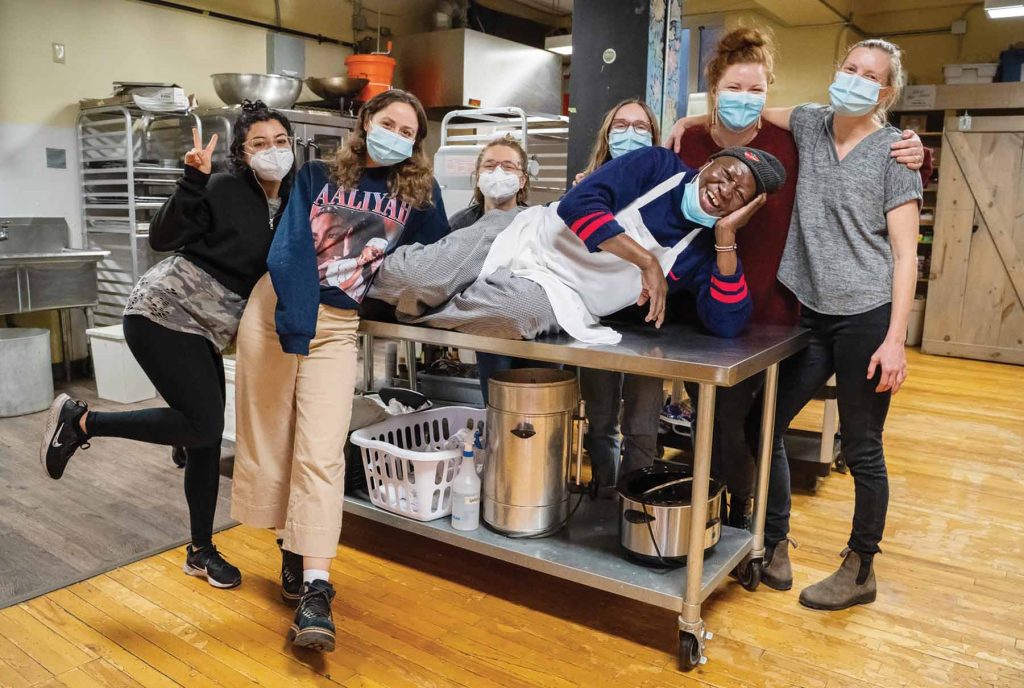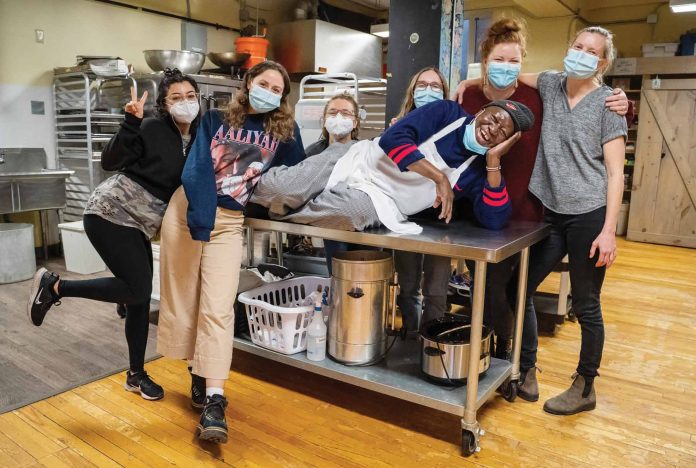
By Charlie Senack
It’s been a tough two years for the Parkdale Food Centre (PFC), which has seen an increase in demand while needing to pivot their services, but the organization has worked to support the community throughout the pandemic. With the world opening back up, the centre’s team is hoping for a return to normal.
Due to low social assistance rates and no increase despite rising costs, Karen Secord, PFC’s executive director, said they are seeing new people—who they call “neighbours” not clients—use their services.
“What we are seeing is people who have never used a food bank before—and were living sort of on the margin—are now needing to have help if they want to eat well,” she said. “There were about 110 people standing in line last week, and that is the most we have ever seen.”
The centre makes over 300 meals and tries to give everyone two each. But that’s not always possible with demand. They are also starting to make 38 food boxes for isolated seniors in the community, on top of helping other marginalized communities.
“We never did that before the pandemic,” said Secord. “All of sudden, COVID hit and everyone was told to stay in their houses. You are living in a shelter, a rooming house, or in a tiny apartment, you are all alone, and you don’t have any money for food. These people were relying on us for our meals and then they had nothing. They don’t have computers or internet, which they also relied on us to provide.”
In non-pandemic times, the PFC door was always open for anyone who needed a meal or was seeking a sense of community. In addition to the distribution of food, the Kitchissippi organization offered workshops, social worker assistance, technology and other resources.
All of that had to pause when the world shut down and stay-at-home orders were issued. Meals were still handed out and food items were available, but all in-person activities had to stop.
A few months into the pandemic, they began offering virtual cooking workshops, providing Chromebooks and six months of free internet to their neighbours who needed it.
In 2021, the PFC launched Cooking For A Cause, a $900,000 program that partnered with 31 social service agencies to distribute 5,000 meals a week. The centre also partnered with 27 restaurants in the community, which helped them with cash flow during turbulent times.
Now, a year later, the program is still running and works with 20 restaurants to feed about 3,000 people weekly.
Outdoor fridge
When the pandemic hit, a number of community fridges were placed around the City of Toronto to help those who were struggling to pay for food. It was an idea Secord had for years, but logistics made the task difficult.
Last May, they were able to place a community fridge outside of 30 Rosemount. The centre rented a wedding tent to keep it dry from the elements, and brought it inside over the winter. Now, back outside with a new shed-like structure, it’s ready to help community members once again.
But, because of its high use and popularity, the PFC is looking for the public’s help to ensure food is always in the fridge.
“We can’t keep it stocked. People are coming from as far as Carleton Place to get food out of it,” said Secord. “We need the community to go by it and place things like yogourt, cheese, apples, and oranges in that fridge. Nothing made at home but fresh vegetables, fruit and dairy.”
Secord hopes other places will launch similar initiatives, but she recognizes the costs associated with it—to provide electricity alone to the site costs over $1,500.
“I have never been at the fridge to put something in it without seeing a senior come from behind me to get food out of it,” she said. “There is nothing sadder than someone who has walked half an hour to the fridge and there is no food left.”
Grocery program
Before the pandemic hit, neighbours of the PFC were able to shop for groceries at their Rosemount branch. COVID-19 meant they had to pivot to food hampers, which the centre never wanted to do.
“When we moved to our current location eight years ago, we wanted to take away barriers and only stalk good quality food which people could pick themselves, and take as many fruits and vegetables as they wanted,” said Secord. “But when COVID started, people could not come inside anymore, and we had to do something we never wanted to do: make hampers and boxes of food.”
The new normal took over most of the facility’s space, making it hard for their other programs to run. Last fall, they opened a non-profit grocery store called Mino’Weesini (an Algonquin word that translates to “good eats”), which mirrored the old model.
The grocery store opened again on May 2, and while appointments are needed for now, it’s back to the old model of neighbours shopping for themselves.
It’s just one of multiple programs the PFC is bringing back as the world rebounds from COVID-19.
“We have also started having breakfast at 30 Rosemount, and hopefully soon a lunch,” said Secord. “It is really about building a neighbourhood. We will be launching a campaign soon on how we come back out of our houses, emerge, and start talking with our neighbors.”
Secord also says they would like to host a community meal on the street this summer so people can meet their neighbours and connect again after so much time apart. They hope to hold smaller meals in local parks and are looking to purchase a mobile pizza oven for similar activities.
Visit parkdalefoodcentre.ca for more information.
This story ran in the Giving section of the Kitchissippi Times May 2022 edition.
